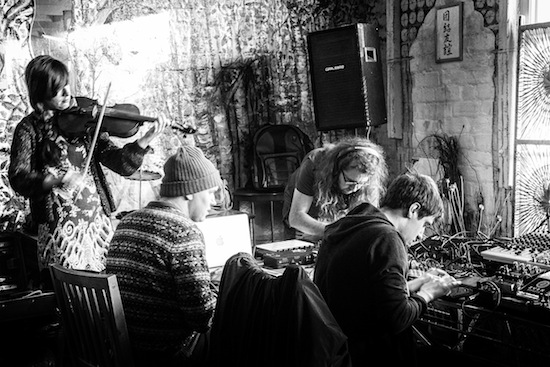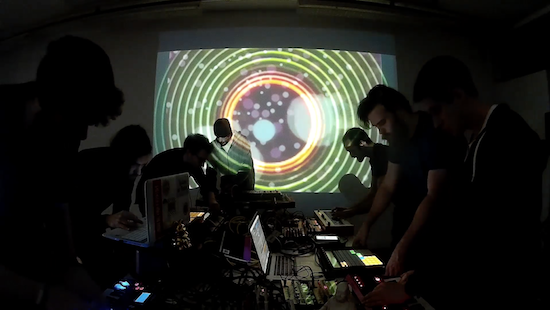“Cosey retweeted us!”
I’m talking via Skype to Joe Cox, Michael Fox, and Matt Briggs of Hull electronic collective SquareWaves. Cox is recalling the moment, some time last year, when he checked the group’s Twitter mentions and discovered the renowned musician and performance artist Cosey Fanni Tutti had shared one of their status updates. “It’s the old social media thing where you see your retweets and all that kind of stuff and you kind of notice, ooh!”
“Cosey noticed us!” Fox chips in.
It wasn’t long after that they got an email inviting SquareWaves to take part in an extensive celebration of the legacy of Coum Transmissions for Hull’s City of Culture festival taking place this spring. “Yes, basically,” was Cox’s response. Fox immediately confirms, “The idea of being able to play in that environment is great. I remember listening to them a lot.”
But as much as the members of SquareWaves I spoke to confessed a longstanding fondness for the music of Fanni Tutti’s old band, Throbbing Gristle, they will be the first to admit that, temperamentally, the two collectives are worlds apart. “We’re the safe boys from Beverley,” says Fox. “As much as I love some of their music, I wouldn’t have been able to handle one of their gigs.”
“We’re certainly less confrontational,” Cox agrees. “We’re all pretty nice and quiet. But in terms of the music coming together itself, there’s definitely some similarities there.”
It’s not hard to see what they mean. Dressed preppily in crewneck sweaters over starched white shirt collars and freshly-laundered zip-up hoodies, they look a little like their wardrobe was picked out by their mums. Some pretty square waves, you might say. But the music they make is anything but. At once squelchily intimate and expansively cinematic, their improvised synth sessions are alive with sinister resonances and alien textures. This is electronic music as convivium, dream space, temporary autonomous zone.
SquareWaves’ origins date back to a Kickstarter page created by Cox in June of 2014. “Hull has incredible diversity;” the page copy read, “but one of the often overlooked areas is within the more alternative areas of electronic music.” The appeal arose, Fox tells me, from the question, “where’s all the electronic music in Hull?”
“The local band nights are very indie-centric,” Cox says, “and the electronic stuff didn’t really appear anywhere. There were a couple of groups dotted around –”
“There were always club nights on,” Fox confirms. “There was always your techno nights and things like this. But there wasn’t the more kind of… different…”
“Alternative electronica.”
“Yeah, there wasn’t really that kind of thing.”
The original idea was just to stick out a compilation CD featuring individual tracks by Cox (under the moniker ‘Azyss’), Fox (‘Gradient Echo’), and various others. Briggs was one of the project’s first backers. Within a month, the Kickstarter had exceeded its funding goal by about a third. By November, that initial album was out. “We launched it at an art night that one of the local street artists does,” Cox recalls. “And we played, jammed. And it was cool.”
“It just sort of all clicked.” says Fox. So, naturally, a month later, they figured, shall we do another?
“From that first jam,” Briggs recalls, “it just kind of snowballed from there.”
Hull’s Zoo Cafe became their base. They began hosting monthly jam sessions there called Zoodles. There was no audience, but essentially anyone was welcome to turn up with their gear and join in. The sessions were recorded and the best bits cut together and chucked up on Bandcamp. “More people joined us over time,” Cox recalls. “People just kept coming.”
Briggs was at music college at the time. “One of the people on the compilation – Max [Beadle] –AppleMax – he was one of my tutors. And he kind of said, we’ve had this open jam, we’re gonna have another. Come along.”
Cox and Fox go back a lot further – and it shows. They have a habit of finishing off each other’s sentences. Old school friends, both grew up in “an incredibly lovely market town” ten miles north of Hull on the A1079. But their respective paths towards their current sonic practice could scarcely be more different.
Fox took piano lessons since primary school, and later ’cello too. “I’ve been playing classical music for quite a length of time,” he says. “Got very bored of it as a teenager, picked up a guitar and thought, oh this is much better!”
Cox, on the other hand, “came to making music through sound and art.” Even before he took his art foundation, he was building up soundscapes from the record function on a portable mp3 player, scraping the mic across radiators and other household surfaces and layering the results on Ableton.

Photography by Ian Finlay
It was Liars that first persuaded the pair “we could do this!” They met up to jam together a few times with their respective noise-makers. Though Fox now readily admits “it never really worked.”
Around the same time, Briggs was getting into Ry Cooder and the raw sounds of the delta blues. But weird music had always been around him. “I grew up in a house with my dad listening to lots of Frank Zappa and things like that,” he says. “So I inherited my music taste from him. Lots of psychedelic rock and prog from there.”
As a teenager, he bought a “cheap electric guitar” and went from there. “I just started picking up instruments and just playing” – from electric bass to the berimbau – “to the point now where it’s just anything I can get an interesting sound out of.”
There’s an inclusiveness and lack of pretension about the SquareWaves project that is enormously refreshing. Over the forty-five odd minutes we spent talking, I heard plenty of ambition, plenty of ideas for how the group – which already boasts some twenty-odd members with around half regular or core attendees – could grow and develop. What I didn’t hear were grand concepts or overarching schema.
“We just pick a tempo, pick a key,” Cox explains. “And we kept recording the sessions. Kept taking the best cuts and sticking them online. Over time, it’s just kind of grown in interest.” The approach is always pragmatic. That, more than anything, is probably the reason for the project’s success.
As they talk about what they do, they tend to reach for the language of jazz – it’s all “jam sessions” and so forth – but the attitude is miles away from the competitive machismo portrayed in films like Whiplash. The records also lack the focus on individual solos and virtuosic ability characteristic of some jazz. To me, it sounds more like a kind of twenty-first century folk music.
Not long ago, I interviewed members of the Los Angeles Free Music Society and they talked about how, when they first started their improvised noise collective in the mid-70s, you couldn’t even buy a mixer, let alone synthesizers (which cost thousands of dollars) or programmable drum machines (which scarcely existed). Today, those barriers to entry have largely come down. It’s as easy to get started on a complex modular set-up as it is to pick up a guitar and learn a few chords – maybe easier. So it’s unsurprising that the kids meeting in the backrooms of pubs are starting to plug in boxes of bleeps and ticks instead of strumming through ‘Whiskey in the Jar’.
“It’s that thing of just knowing what’s the rules,” Fox says, “ok, we’re going to play in this key, that speed, let’s go –” From those simple ingredients they’ve created a free and convivial platform to explore sounds and ideas and to have fun making music together. The only problem is finding a name for what they do. “It is quite confusing,” Cox admits. “We always describe ourselves as not-a-band.”
“SquareWaves is an artist name, it’s a night, it’s a compilation cd, it’s a stage at Humber Street Sesh. It’s kind of everything that is, like we said, not a band.”


